Unit 1 Where did you go on vacation? Section A 1a-2d课件+内嵌音频
文档属性
| 名称 | Unit 1 Where did you go on vacation? Section A 1a-2d课件+内嵌音频 | 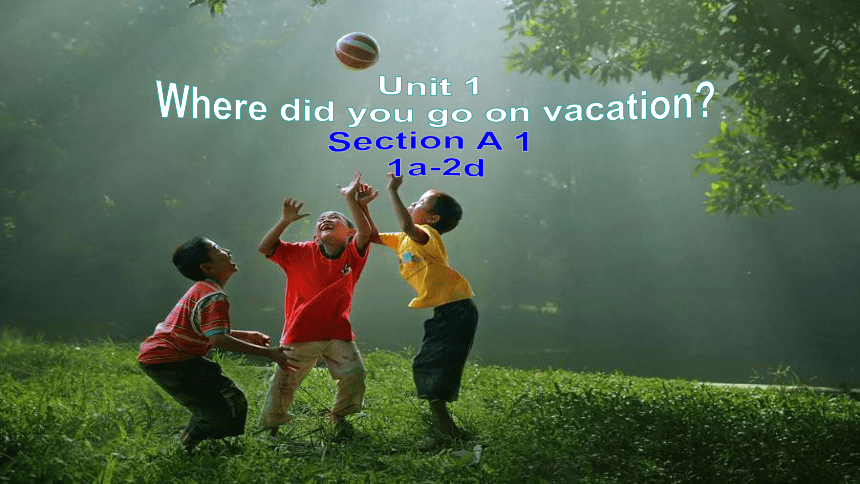 | |
| 格式 | pptx | ||
| 文件大小 | 18.6MB | ||
| 资源类型 | 试卷 | ||
| 版本资源 | 人教新目标(Go for it)版 | ||
| 科目 | 英语 | ||
| 更新时间 | 2024-09-06 08:37:16 | ||
图片预览


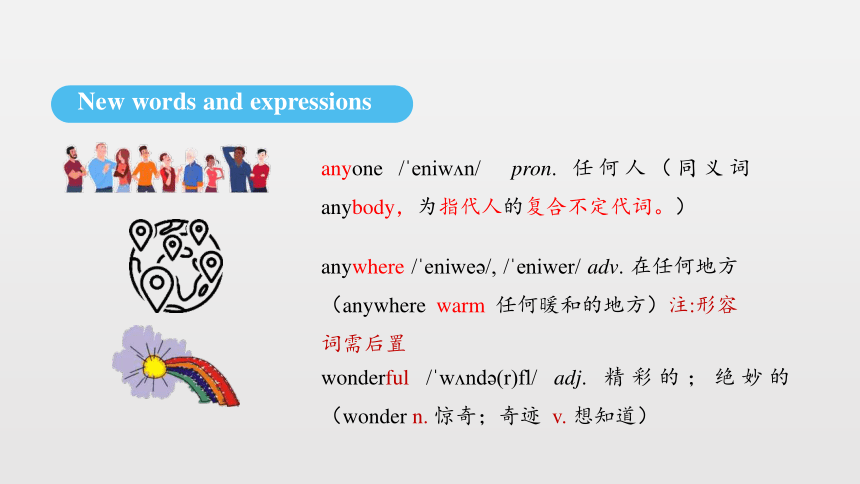
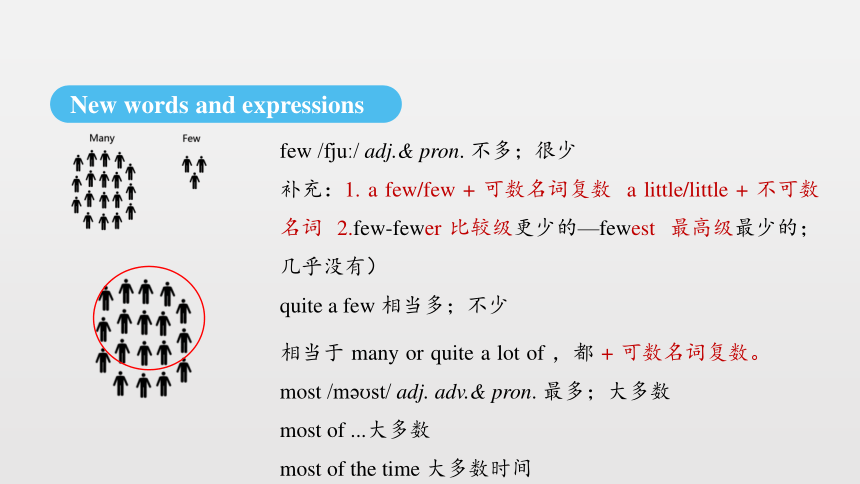
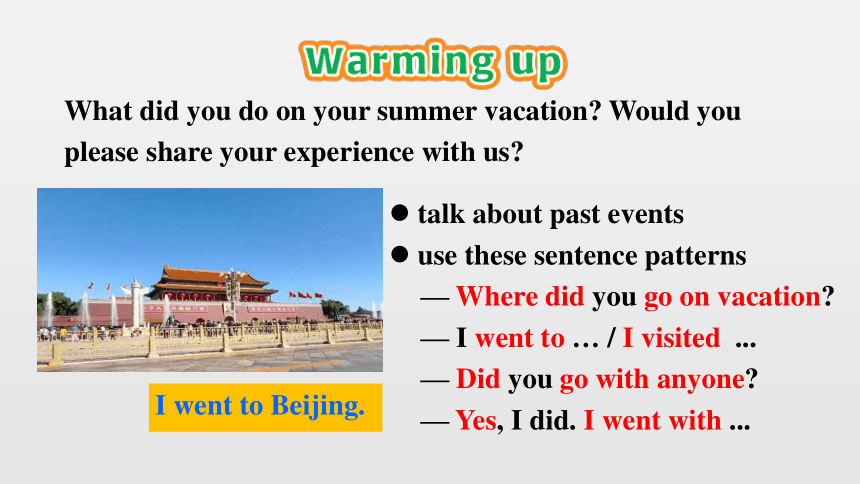
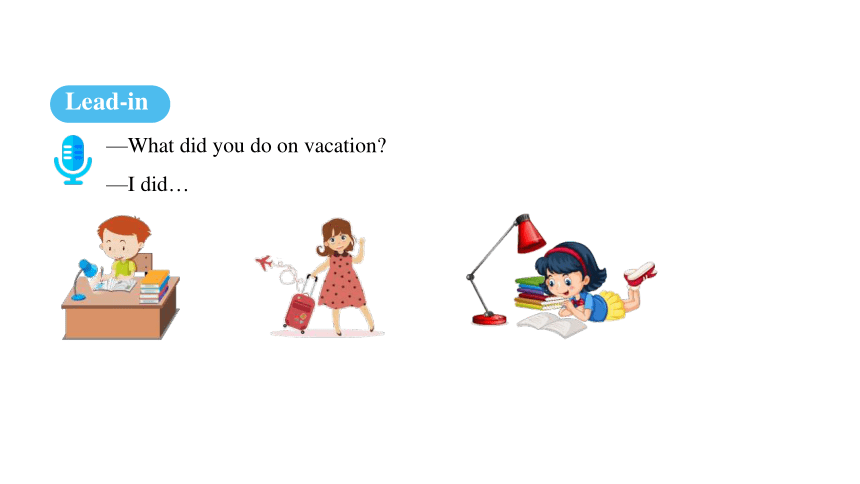
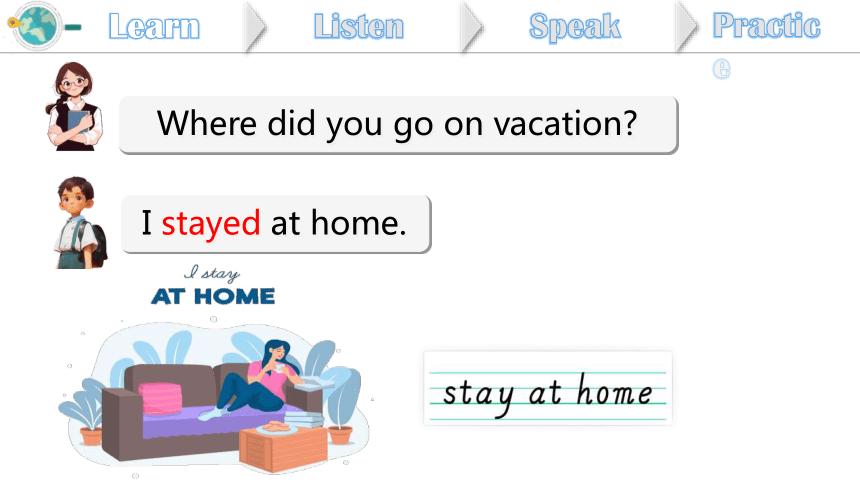
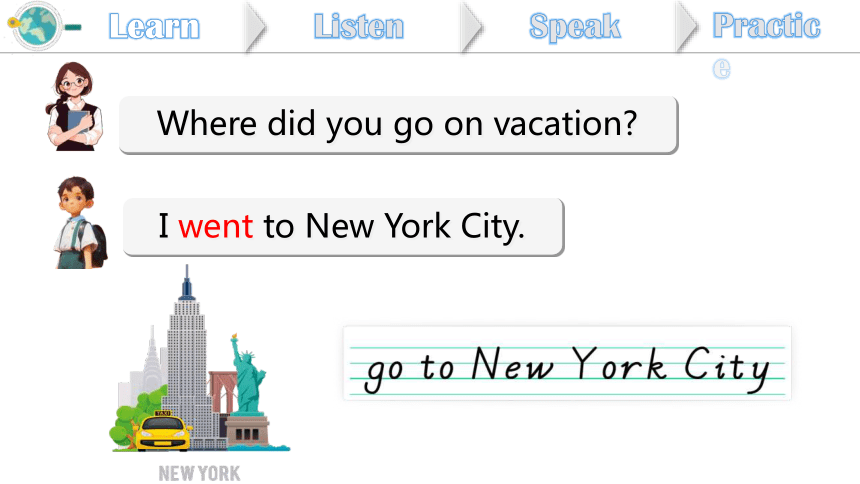
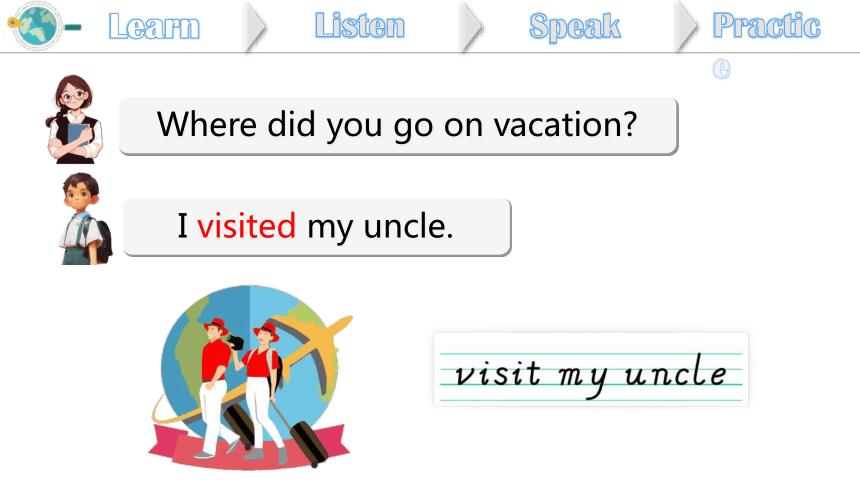
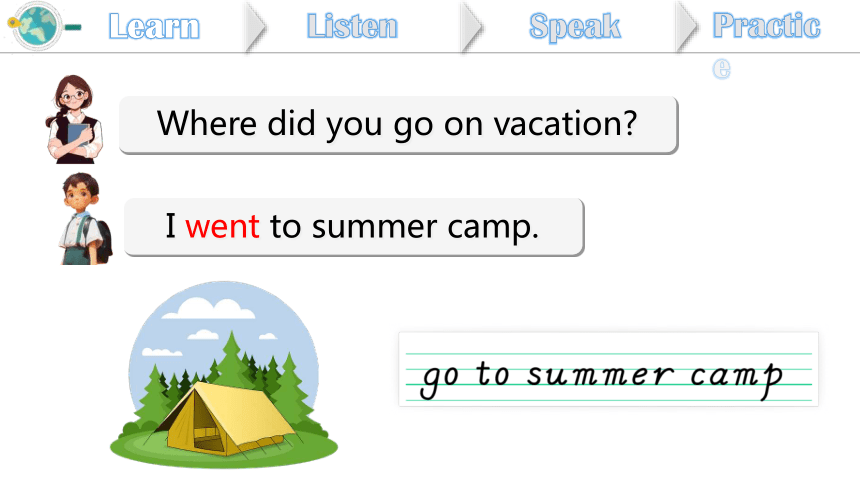
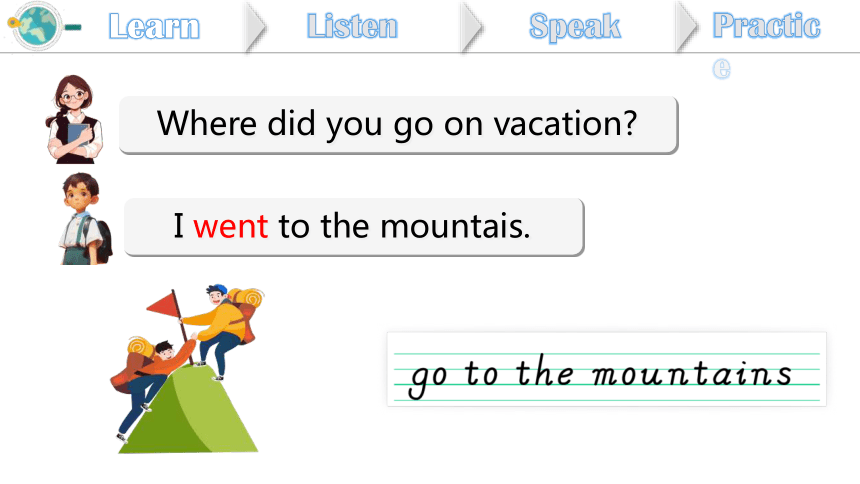
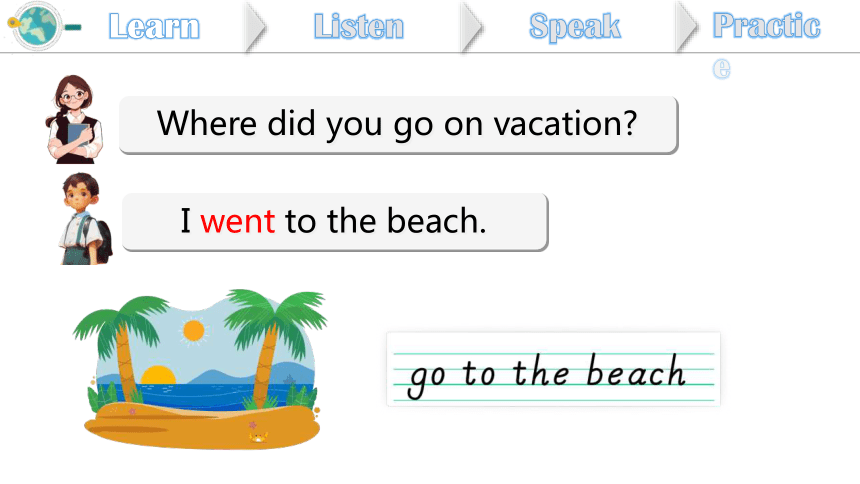
文档简介
(共56张PPT)
Unit 1
Where did you go on vacation
Section A 1
1a-2d
anyone / eniw n/ pron. 任何人
anywhere / eniwe /, / eniwer/ adv. 在任何地方
wonderful / w nd (r)fl/ adj. 精彩的;绝妙的
few /fju / adj.& pron. 不多;很少
quite a few 相当多;不少
most /m st/ adj. adv.& pron.最多;大多数
most of the time 大多数时间
New words and expressions
anyone / eniw n/ pron. 任何人(同义词anybody,为指代人的复合不定代词。)
anywhere / eniwe /, / eniwer/ adv. 在任何地方(anywhere warm 任何暖和的地方)注:形容词需后置
wonderful / w nd (r)fl/ adj. 精彩的;绝妙的(wonder n. 惊奇;奇迹 v. 想知道)
New words and expressions
few /fju / adj.& pron. 不多;很少
补充:1. a few/few + 可数名词复数 a little/little + 不可数名词 2.few-fewer 比较级更少的—fewest 最高级最少的;几乎没有)
quite a few 相当多;不少
相当于 many or quite a lot of ,都 + 可数名词复数。
most /m st/ adj. adv.& pron. 最多;大多数
most of ...大多数
most of the time 大多数时间
New words and expressions
What did you do on your summer vacation Would you please share your experience with us
I went to Beijing.
talk about past events
use these sentence patterns
— Where did you go on vacation
— I went to … / I visited ...
— Did you go with anyone
— Yes, I did. I went with ...
Lead-in
—What did you do on vacation
—I did…
Learn
Listen
Speak
Practice
Where did you go on vacation
I stayed at home.
Listen
Speak
Practice
Where did you go on vacation
I went to New York City.
Learn
Listen
Speak
Practice
Where did you go on vacation
I visited my uncle.
Learn
Listen
Speak
Practice
Where did you go on vacation
I went to summer camp.
Learn
Listen
Speak
Practice
Where did you go on vacation
I went to the mountais.
Learn
Listen
Speak
Practice
Where did you go on vacation
I went to the beach.
Learn
Listen
Speak
Practice
Where did you go on vacation
I visited museums.
Learn
1. stayed at home __
2. went to New York
City __
3. visited my uncle __
4. went to summer
camp __
5. went to the
mountains __
6. went to the beach __
7. visited museums ___
1a
f
b
g
d
c
a
e
Match the activities with the pictures.[a-g]
Listen and number the people in the picture (1-5).
1. Tina
2. Xiang Hua
3. Sally
4. Bob
5. Tom
4
3
2
5
·英语
【听填信息】
Section A,1b
Conversation 1
Xiang Hua: Hey,Tina.Where did you go on 1.
Tina:I went to the mountains with my family.
Xiang Hua: Did 2. have a good time
Tina:Oh,yes.3. was excellent.Where did you go,Xiang Hua
Xiang Hua: I went to New York City.
Everything
everyone
vacation
·英语
Conversation 2
Girl:What did you do on vacation,Sally
Sally:4. .I just stayed at home.
Girl: And did you do 5. interesting,Bob
Bob:Yes.I visited my uncle.We went fishing,but we didn’t get any fish.
anything
Nothing
Conversation 3
Boy:Did you go 6. on vacation,Tom
Tom:I went to summer camp.
Boy:Did you go with 7.
Tom:Yes.I went with my friends.Everyone had a
8. time.
great
anyone
anywhere
go on vacation 去度假
go to summer camp
去夏令营
—Did … go with anyone
—Yes, ... I went with ...
是一般过去时的一般疑问句,回答多用yes或no。
Where did you go ... 是一般过去时的特殊疑问句,did是助动词,动词go用原形。
go to the mountains
去爬山
Where did you go on vacation
I went to the mountains.
Practice
Make your own
conversations.
Where did you go
I went to the Great Wall.
Did you go with anyone
…
Did you meet anyone interesting
…
Did you eat anything delicious
pron. 任何人
Make conversations about the people in the picture.
Where did Tina go on vacation
She went to the mountains.
Where did …
go on vacation
She / He …
Work in groups and talk about your vacation.
Did you go with anyone
Did you meet anyone interesting
Did you eat anything delicious
anyone/anybody(任何人), anything(任何事物;任何东西)均为复合不定代词,常见的复合不定代词还有everything, something, nothing, everybody/everyone, somebody/ someone, anybody/anyone, nobody/no one。
everything 每件事;一切
something 某事;某物
anything 任何事物;任何东西
nothing 没有什么;没有一件东西
everybody / everyone 每人;人人;所有人
somebody / someone 某人
anybody / anyone 任何人
nobody / no one 没有人
Look at 2a, 2b and the picture on page 2, and answer the questions.
How many people are there in the conversations What are their names
Where was this girl Was she in the park Or was she on the beach
What activities are in the chart
Look at the picture and answer:
Where was the girl
At Center Park
She was on vavation.
Pre-listening
Enrich your life today,yesterday is ow is mystery
While-listening
New York City, Central Park
the beach
stayed at home
Listen. Where did the people go on vacation
专有名词首字母要大写
Did they go anywhere interesting
Did they go with anyone
Did they do anything interesting
anywhere 任何地方
anyone 任何人
Enrich your life today,yesterday is ow is mystery
Listen. Where did the people go on vacation Complete the chart.
People Places
Grace
Kevin
Julie
New York City (Central Park)
the beach
stayed at home
Listen again. Check (√) Yes, I did or No, I didn’t for each question.
Did you … Yes, I did. No, I didn’t.
Grace go with anyone
go to Central Park
buy anything special
√
√
√
Did you … Yes, I did. No, I didn’t.
Kevin play volleyball
swim
meet anyone interesting
√
√
√
Julie do anything interesting
study for tests
go out with anyone
√
√
√
Tapescript
Conversation 1
Boy: Where did you go on vacation, Grace
Grace: I went to New York City.
Boy: Oh, really Did you go with anyone
Grace: Yes. I went with my mother.
Boy: Did you go to Central Park
Grace: Yes, I did. It was really nice.
Boy: Did you buy anything special
Grace: Yes. I bought something for my father.
Boy: Oh, really What
Grace: I bought him a hat.
anyone 意为“任何人”,为指代人的复合不定代词。
Tapescript
Conversation 2
Girl: Where did you go on vacation, Kevin
Kevin: I went to the beach.
Girl: Oh, that’s nice. Did you play volleyball
Kevin: No, I didn’t.
Girl: Well, did you swim
Kevin: Yes, I did. The water was really warm.
Girl: How was the food
Kevin: Everything tasted really good!
Girl: Did you meet anyone interesting
Kevin: Yes. I met some very interesting people.
taste 意为“尝起来”,此时作为连系动词使用,后接形容词。
Tapescript
Conversation 3
Boy: Where did you go on your vacation, Julie
Julie: I stayed at home.
Boy: Oh. So, did you do anything interesting
Julie: No, I didn’t.
Boy: Did you study for your tests
Julie: Yes, I did.
Boy: Did you go out with anyone
Julie: No. No one was here. Everyone was on vacation.
for 作为连词使用时,通常后接原因或目的。
buy sth. for sb.(= buy sb. sth.)
给某人买某物
go to the beach 去海滩
taste good 尝起来不错
— Where did … go on vacation
— I went to ...
—Did … go with anyone
—Yes. I went with ...
stay at home 待在家
study for tests 备考
go out 外出(娱乐)
Role-play conversations between Grace, Kevin and Julie.
A: Grace, where did you go on vacation
B: I went to New York City.
A: Oh, really Did you go with anyone
B: Yes, I went with my mother.
Julie, where did you go on vacation
I ...
Oh, really Did you go with anyone
Yes, I ...
A: …, where did you go on vacation
B: I went to ….
A: Oh, did you …
B: Yes, I … .
Tian’anmen Square
the Great Wall
Pairwork
Enrich your life today,yesterday is ow is mystery
Huangguoshu Waterfall
Huangguoshu Waterfall is an interesting and wonderful place in Guizhou. You can see quite a few waterfalls in China, but Huangguoshu Waterfall is very special. It’s special because it’s great and beautiful. It’s the biggest waterfall in China. People take lots of photos of this waterfall and here’s one.
wonderful adj.
精彩的; 绝妙的
quite a few
相当多; 不少
few adj. & pron.
不多; 很少
Did Helen go anywhere interesting
2. Did she see anything wonderful
4. Did Rick do anything special What did he do
Yes, she went to Guizhou with her family.
Yes, she saw Huangguoshu Waterfall.
No, he just stayed at home most of the time to read and relax.
Read the conversation and answer the questions.
Yes, she took quite a few photos there.
3. Did she take any photos
当形容词修饰复合不定代词时,要后置。
好久不见。
most of the time 大多数时候
Language points
1. Did you buy anything special
在英语中,anything, something, nothing和everything是用于指代事物的复合不定代词,与之相对应的复合不定代词anyone, someone, no one和everyone (anybody, somebody, nobody和everybody) 用于指人。与形容词连用时,形容词必须置于复合不定词之后,语法上称作“后置”。
e.g. I can see ____________ in your group.
我在你团队里看到一个新人。
There’s __________________ in the news today.
今天没什么有趣的新闻。
someone new
nothing interesting
2. Did you go _____________________
你去任何有趣的地方了吗?
anywhere意为“在任何地方”,常用于一般疑问句或否定句中,代替somewhere。
e.g. I can’t find my keys anywhere.
我到处也找不到我的钥匙。
anywhere interesting
3. We took quite a few photos there.
a few 意为“一些,若干(=some)”,后跟可数名词复数形式。
quite a few 意为“相当多;不少(=many)”后跟可数名词复数形式。
e.g. __________ are playing volleyball.
几个女孩正在打排球。
There are ______________ in the forest.
在那片森林里有很多鸟。
A few girls
quite a few birds
4. I just stayed at home most of the time to read and relax.
most意为“_________”,后跟可数名词或不可数名词均可。
e.g. Most students go to school on foot.
大多数学生步行去上学。
Most of the food is fresh.大部分的食物是新鲜的。
most of 意为“大部分的”,做主语时,谓语动词的单复数取决于of 后面的名词;of 后是复数名词或代词,位于动词用复数形式,否则用第三人称单数形式。
大多数
We took quite a few photos there.
我们在那里拍了不少照片。
few adj. & pron. 不多,很少
a few 一些,若干(= some)后跟可数名词复数形式
quite a few 相当多;不少(=many)后跟可数名词复数形式
e.g. A few girls are playing volleyball.
几个女孩正在打排球。
There are quite a few birds in the forest.
在那片森林里有很多鸟。
few 作形容词,后跟可数名词复数,在句中表示否定意义。 few students
几乎没有学生
a few 后跟可数名词复数,意为“有些;几个”, 具有肯定意义。 a few people 少数人
few, a few, little, a little
little adj. 小的; 年幼的;幼小的 a little box 一个小盒子
my little brother 我弟弟
pron. 少量的 (与不可数名词连用,在句中表示否定意义) little money 几乎没钱
a little 后跟不可数名词时,意为“少量的;一些”,具有肯定意义。 a little tea 少许茶
后跟形容词时,意为“一点;少量”。 a little big 有点大
few, a few, little, a little
most + 名词 泛指多数,无范围;
most + of + the (this/that/those/these等)名
词 ,指某一范围内的多数。
e.g. __________________ go to school by
bike.
这些学生们中的多数骑自行车去上
学。
Most of the students
Fill in the blanks and then retell the conversation.
Helen was ______ ______ last month. She went to Guizhou with his family. They ______ Huangguoshu Waterfall. They ______ _______ ______ _______ ______ there. Rick just ______ _______ ______ most of the time to ______ _______ ______ .
on
vacation
saw
took
quite
a
few
photos
stayed
at
home
read
and
relax
Enrich your life today,yesterday is ow is mystery
Exercise
根据汉语提示完成句子。
1. Did he go out with _______ (任何人)
2. They didn’t buy ________ ______ (特殊的东西) there yesterday.
3. Tell us __________ __________ (有趣的事情) about your vacation, Jenny.
anyone
something interesting
anything special
4. They caught ______ ___ ____ (相当多的) insects in the forest.
5. _____ __ ___ (大多数) students can get to school early.
quite a few
Most of the
__________________ 去度假
__________________ 给某人买某物
go to summer camp __________
go to the beach __________
__________________ 去爬山
__________________ 好久不见
__________________ 大多数时候__________________ 备考
go on vacation
buy sth. for sb.
去夏令营
去海滩
go to the mountains
long time no see
most of the time
study for tests
Learn
Listen
Speak
Practice
1. 去沙滩 __________________
2. 参观博物馆 ___________________
4. 呆在家 ___________________
5. 去爬山 ___________________
6. 去纽约 ___________________
go to the beach
visit museums
stay at home
go to the mountains
go to New York City
____________相当多;不少
____________ 待在家
taste good ______________
go out ______________
quite a few
stay at home
尝起来不错
外出(娱乐)
— Where did you go on vacation
— I went to New York City.
— Did you go with anyone
— Yes, I went with my sister.
Homework
Read the dialogue in 2d.
Share something interesting on your holiday with your classmates.
Unit 1
Where did you go on vacation
Section A 1
1a-2d
anyone / eniw n/ pron. 任何人
anywhere / eniwe /, / eniwer/ adv. 在任何地方
wonderful / w nd (r)fl/ adj. 精彩的;绝妙的
few /fju / adj.& pron. 不多;很少
quite a few 相当多;不少
most /m st/ adj. adv.& pron.最多;大多数
most of the time 大多数时间
New words and expressions
anyone / eniw n/ pron. 任何人(同义词anybody,为指代人的复合不定代词。)
anywhere / eniwe /, / eniwer/ adv. 在任何地方(anywhere warm 任何暖和的地方)注:形容词需后置
wonderful / w nd (r)fl/ adj. 精彩的;绝妙的(wonder n. 惊奇;奇迹 v. 想知道)
New words and expressions
few /fju / adj.& pron. 不多;很少
补充:1. a few/few + 可数名词复数 a little/little + 不可数名词 2.few-fewer 比较级更少的—fewest 最高级最少的;几乎没有)
quite a few 相当多;不少
相当于 many or quite a lot of ,都 + 可数名词复数。
most /m st/ adj. adv.& pron. 最多;大多数
most of ...大多数
most of the time 大多数时间
New words and expressions
What did you do on your summer vacation Would you please share your experience with us
I went to Beijing.
talk about past events
use these sentence patterns
— Where did you go on vacation
— I went to … / I visited ...
— Did you go with anyone
— Yes, I did. I went with ...
Lead-in
—What did you do on vacation
—I did…
Learn
Listen
Speak
Practice
Where did you go on vacation
I stayed at home.
Listen
Speak
Practice
Where did you go on vacation
I went to New York City.
Learn
Listen
Speak
Practice
Where did you go on vacation
I visited my uncle.
Learn
Listen
Speak
Practice
Where did you go on vacation
I went to summer camp.
Learn
Listen
Speak
Practice
Where did you go on vacation
I went to the mountais.
Learn
Listen
Speak
Practice
Where did you go on vacation
I went to the beach.
Learn
Listen
Speak
Practice
Where did you go on vacation
I visited museums.
Learn
1. stayed at home __
2. went to New York
City __
3. visited my uncle __
4. went to summer
camp __
5. went to the
mountains __
6. went to the beach __
7. visited museums ___
1a
f
b
g
d
c
a
e
Match the activities with the pictures.[a-g]
Listen and number the people in the picture (1-5).
1. Tina
2. Xiang Hua
3. Sally
4. Bob
5. Tom
4
3
2
5
·英语
【听填信息】
Section A,1b
Conversation 1
Xiang Hua: Hey,Tina.Where did you go on 1.
Tina:I went to the mountains with my family.
Xiang Hua: Did 2. have a good time
Tina:Oh,yes.3. was excellent.Where did you go,Xiang Hua
Xiang Hua: I went to New York City.
Everything
everyone
vacation
·英语
Conversation 2
Girl:What did you do on vacation,Sally
Sally:4. .I just stayed at home.
Girl: And did you do 5. interesting,Bob
Bob:Yes.I visited my uncle.We went fishing,but we didn’t get any fish.
anything
Nothing
Conversation 3
Boy:Did you go 6. on vacation,Tom
Tom:I went to summer camp.
Boy:Did you go with 7.
Tom:Yes.I went with my friends.Everyone had a
8. time.
great
anyone
anywhere
go on vacation 去度假
go to summer camp
去夏令营
—Did … go with anyone
—Yes, ... I went with ...
是一般过去时的一般疑问句,回答多用yes或no。
Where did you go ... 是一般过去时的特殊疑问句,did是助动词,动词go用原形。
go to the mountains
去爬山
Where did you go on vacation
I went to the mountains.
Practice
Make your own
conversations.
Where did you go
I went to the Great Wall.
Did you go with anyone
…
Did you meet anyone interesting
…
Did you eat anything delicious
pron. 任何人
Make conversations about the people in the picture.
Where did Tina go on vacation
She went to the mountains.
Where did …
go on vacation
She / He …
Work in groups and talk about your vacation.
Did you go with anyone
Did you meet anyone interesting
Did you eat anything delicious
anyone/anybody(任何人), anything(任何事物;任何东西)均为复合不定代词,常见的复合不定代词还有everything, something, nothing, everybody/everyone, somebody/ someone, anybody/anyone, nobody/no one。
everything 每件事;一切
something 某事;某物
anything 任何事物;任何东西
nothing 没有什么;没有一件东西
everybody / everyone 每人;人人;所有人
somebody / someone 某人
anybody / anyone 任何人
nobody / no one 没有人
Look at 2a, 2b and the picture on page 2, and answer the questions.
How many people are there in the conversations What are their names
Where was this girl Was she in the park Or was she on the beach
What activities are in the chart
Look at the picture and answer:
Where was the girl
At Center Park
She was on vavation.
Pre-listening
Enrich your life today,yesterday is ow is mystery
While-listening
New York City, Central Park
the beach
stayed at home
Listen. Where did the people go on vacation
专有名词首字母要大写
Did they go anywhere interesting
Did they go with anyone
Did they do anything interesting
anywhere 任何地方
anyone 任何人
Enrich your life today,yesterday is ow is mystery
Listen. Where did the people go on vacation Complete the chart.
People Places
Grace
Kevin
Julie
New York City (Central Park)
the beach
stayed at home
Listen again. Check (√) Yes, I did or No, I didn’t for each question.
Did you … Yes, I did. No, I didn’t.
Grace go with anyone
go to Central Park
buy anything special
√
√
√
Did you … Yes, I did. No, I didn’t.
Kevin play volleyball
swim
meet anyone interesting
√
√
√
Julie do anything interesting
study for tests
go out with anyone
√
√
√
Tapescript
Conversation 1
Boy: Where did you go on vacation, Grace
Grace: I went to New York City.
Boy: Oh, really Did you go with anyone
Grace: Yes. I went with my mother.
Boy: Did you go to Central Park
Grace: Yes, I did. It was really nice.
Boy: Did you buy anything special
Grace: Yes. I bought something for my father.
Boy: Oh, really What
Grace: I bought him a hat.
anyone 意为“任何人”,为指代人的复合不定代词。
Tapescript
Conversation 2
Girl: Where did you go on vacation, Kevin
Kevin: I went to the beach.
Girl: Oh, that’s nice. Did you play volleyball
Kevin: No, I didn’t.
Girl: Well, did you swim
Kevin: Yes, I did. The water was really warm.
Girl: How was the food
Kevin: Everything tasted really good!
Girl: Did you meet anyone interesting
Kevin: Yes. I met some very interesting people.
taste 意为“尝起来”,此时作为连系动词使用,后接形容词。
Tapescript
Conversation 3
Boy: Where did you go on your vacation, Julie
Julie: I stayed at home.
Boy: Oh. So, did you do anything interesting
Julie: No, I didn’t.
Boy: Did you study for your tests
Julie: Yes, I did.
Boy: Did you go out with anyone
Julie: No. No one was here. Everyone was on vacation.
for 作为连词使用时,通常后接原因或目的。
buy sth. for sb.(= buy sb. sth.)
给某人买某物
go to the beach 去海滩
taste good 尝起来不错
— Where did … go on vacation
— I went to ...
—Did … go with anyone
—Yes. I went with ...
stay at home 待在家
study for tests 备考
go out 外出(娱乐)
Role-play conversations between Grace, Kevin and Julie.
A: Grace, where did you go on vacation
B: I went to New York City.
A: Oh, really Did you go with anyone
B: Yes, I went with my mother.
Julie, where did you go on vacation
I ...
Oh, really Did you go with anyone
Yes, I ...
A: …, where did you go on vacation
B: I went to ….
A: Oh, did you …
B: Yes, I … .
Tian’anmen Square
the Great Wall
Pairwork
Enrich your life today,yesterday is ow is mystery
Huangguoshu Waterfall
Huangguoshu Waterfall is an interesting and wonderful place in Guizhou. You can see quite a few waterfalls in China, but Huangguoshu Waterfall is very special. It’s special because it’s great and beautiful. It’s the biggest waterfall in China. People take lots of photos of this waterfall and here’s one.
wonderful adj.
精彩的; 绝妙的
quite a few
相当多; 不少
few adj. & pron.
不多; 很少
Did Helen go anywhere interesting
2. Did she see anything wonderful
4. Did Rick do anything special What did he do
Yes, she went to Guizhou with her family.
Yes, she saw Huangguoshu Waterfall.
No, he just stayed at home most of the time to read and relax.
Read the conversation and answer the questions.
Yes, she took quite a few photos there.
3. Did she take any photos
当形容词修饰复合不定代词时,要后置。
好久不见。
most of the time 大多数时候
Language points
1. Did you buy anything special
在英语中,anything, something, nothing和everything是用于指代事物的复合不定代词,与之相对应的复合不定代词anyone, someone, no one和everyone (anybody, somebody, nobody和everybody) 用于指人。与形容词连用时,形容词必须置于复合不定词之后,语法上称作“后置”。
e.g. I can see ____________ in your group.
我在你团队里看到一个新人。
There’s __________________ in the news today.
今天没什么有趣的新闻。
someone new
nothing interesting
2. Did you go _____________________
你去任何有趣的地方了吗?
anywhere意为“在任何地方”,常用于一般疑问句或否定句中,代替somewhere。
e.g. I can’t find my keys anywhere.
我到处也找不到我的钥匙。
anywhere interesting
3. We took quite a few photos there.
a few 意为“一些,若干(=some)”,后跟可数名词复数形式。
quite a few 意为“相当多;不少(=many)”后跟可数名词复数形式。
e.g. __________ are playing volleyball.
几个女孩正在打排球。
There are ______________ in the forest.
在那片森林里有很多鸟。
A few girls
quite a few birds
4. I just stayed at home most of the time to read and relax.
most意为“_________”,后跟可数名词或不可数名词均可。
e.g. Most students go to school on foot.
大多数学生步行去上学。
Most of the food is fresh.大部分的食物是新鲜的。
most of 意为“大部分的”,做主语时,谓语动词的单复数取决于of 后面的名词;of 后是复数名词或代词,位于动词用复数形式,否则用第三人称单数形式。
大多数
We took quite a few photos there.
我们在那里拍了不少照片。
few adj. & pron. 不多,很少
a few 一些,若干(= some)后跟可数名词复数形式
quite a few 相当多;不少(=many)后跟可数名词复数形式
e.g. A few girls are playing volleyball.
几个女孩正在打排球。
There are quite a few birds in the forest.
在那片森林里有很多鸟。
few 作形容词,后跟可数名词复数,在句中表示否定意义。 few students
几乎没有学生
a few 后跟可数名词复数,意为“有些;几个”, 具有肯定意义。 a few people 少数人
few, a few, little, a little
little adj. 小的; 年幼的;幼小的 a little box 一个小盒子
my little brother 我弟弟
pron. 少量的 (与不可数名词连用,在句中表示否定意义) little money 几乎没钱
a little 后跟不可数名词时,意为“少量的;一些”,具有肯定意义。 a little tea 少许茶
后跟形容词时,意为“一点;少量”。 a little big 有点大
few, a few, little, a little
most + 名词 泛指多数,无范围;
most + of + the (this/that/those/these等)名
词 ,指某一范围内的多数。
e.g. __________________ go to school by
bike.
这些学生们中的多数骑自行车去上
学。
Most of the students
Fill in the blanks and then retell the conversation.
Helen was ______ ______ last month. She went to Guizhou with his family. They ______ Huangguoshu Waterfall. They ______ _______ ______ _______ ______ there. Rick just ______ _______ ______ most of the time to ______ _______ ______ .
on
vacation
saw
took
quite
a
few
photos
stayed
at
home
read
and
relax
Enrich your life today,yesterday is ow is mystery
Exercise
根据汉语提示完成句子。
1. Did he go out with _______ (任何人)
2. They didn’t buy ________ ______ (特殊的东西) there yesterday.
3. Tell us __________ __________ (有趣的事情) about your vacation, Jenny.
anyone
something interesting
anything special
4. They caught ______ ___ ____ (相当多的) insects in the forest.
5. _____ __ ___ (大多数) students can get to school early.
quite a few
Most of the
__________________ 去度假
__________________ 给某人买某物
go to summer camp __________
go to the beach __________
__________________ 去爬山
__________________ 好久不见
__________________ 大多数时候__________________ 备考
go on vacation
buy sth. for sb.
去夏令营
去海滩
go to the mountains
long time no see
most of the time
study for tests
Learn
Listen
Speak
Practice
1. 去沙滩 __________________
2. 参观博物馆 ___________________
4. 呆在家 ___________________
5. 去爬山 ___________________
6. 去纽约 ___________________
go to the beach
visit museums
stay at home
go to the mountains
go to New York City
____________相当多;不少
____________ 待在家
taste good ______________
go out ______________
quite a few
stay at home
尝起来不错
外出(娱乐)
— Where did you go on vacation
— I went to New York City.
— Did you go with anyone
— Yes, I went with my sister.
Homework
Read the dialogue in 2d.
Share something interesting on your holiday with your classmates.
同课章节目录
- Unit 1 Where did you go on vacation?
- Section A
- Section B
- Unit 2 How often do you exercise?
- Section A
- Section B
- Unit 3 I'm more outgoing than my sister.
- Section A
- Section B
- Unit 4 What's the best movie theater?
- Section A
- Section B
- Unit 5 Do you want to watch a game show?
- Section A
- Section B
- Unit 6 I'm going to study computer science.
- Section A
- Section B
- Unit 7 Will people have robots?
- Section A
- Section B
- Unit 8 How do you make a banana milk shake?
- Section A
- Section B
- Unit 9 Can you come to my party?
- Section A
- Section B
- Unit 10 If you go to the party, you'll have a grea
- Section A
- Section B
